What We Know:
Family name: Eisemann
Given name: Max Moses
Date/place of birth: 2 June 1886, Bauerbach, Thüringen
Date/place of death: Exact date of death unknown
Age: 56 years old at deportation
![]() Max Moses Eisemann was born on 21 June 1886 in Bauerbach, Thüringen, the second child, and first son, of Abraham and Regina (née Maier) Eisemann.
Max Moses Eisemann was born on 21 June 1886 in Bauerbach, Thüringen, the second child, and first son, of Abraham and Regina (née Maier) Eisemann.
The Eisemann family traced its roots in Sachsen-Meiningen/Thuringia back to the late 1700s in Bauerbach and the family of Isaac Eisemann, born about 1770. Isaac and his wife, Karline (née Gitel), born about 1776, raised five children in Bauerbach: Abraham Eisemann, born 14 June 1853, was son of Meier Eisemann.
On 3 September 1883, Abraham married Regina Maier from Geroldshausen near Würzburg in Bavaria. Little is known about Regina, other than her birth date & place. Upon marriage, she moved to Bauerbach, and the couple started their family in 1884 with the birth of Klara. Seven children followed, all born in Bauerbach, (see outline of family here). Max’s younger siblings were: (Isak) Julius b. 1888; Ida, b. 1890; Hugo, b. 1892; Regina/Rieckchen/Ricke, b. 1894; Meinhold, b. 1897; and Benno Eisemann, b. 1900.
Max and his sister Klara were the first to leave Bauerbach to pursue economic opportunities elsewhere. In 1910, twenty-six-year-old Klara married Willy/Willi Frank. The Franks decided to live in Bad Salzungen, and Max joined them. Max lived with the Franks at Ratsstraße 9, a property that belonged to their father. By 1913, Willy Frank and Max Moses Eisemann had fulfilled the dream of owning their own business: their store “Eisemann and Frank”, located on the ground floor of their apartment building, both sold and repaired sewing machines and bicycles. Willy and Klara also started a family; in 1911, son Albert was born, followed by daughter Ilse on 10 April 1913.
Three of Abraham’s and Regine’s sons — Julius, Max Moses and Meinhold — and son-in-law Willy Frank fought in the German army during World I. Meinhold, for example, served in the Bayer. Reserve-Infanterie-Regiment Nr. 4.
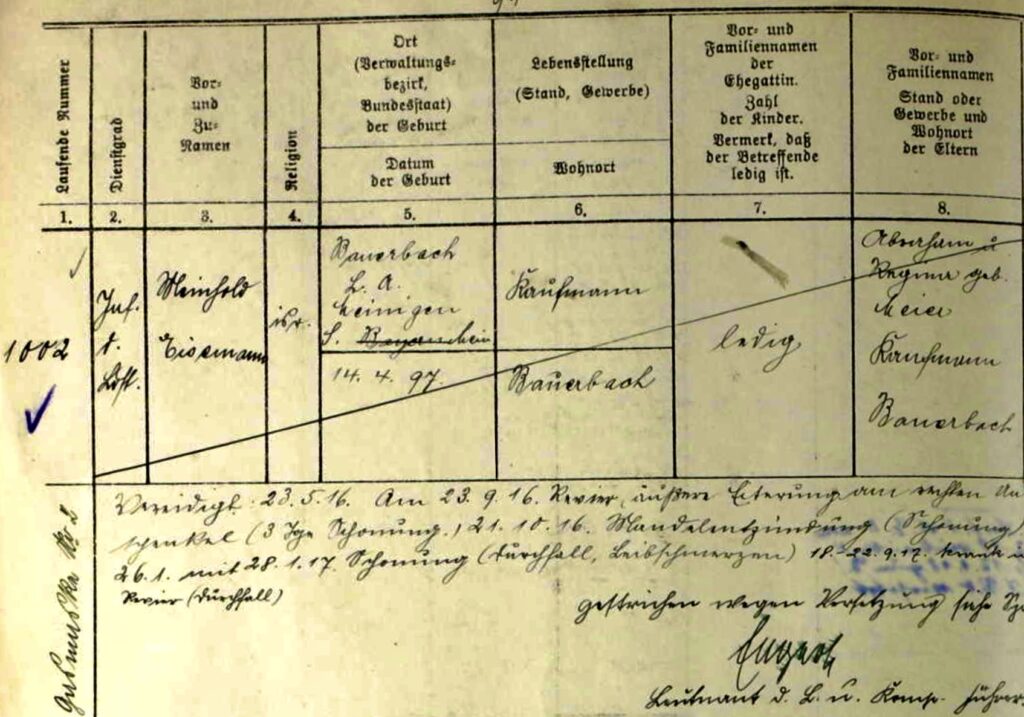
In the final years of the war and the early 1920s, the Eisemanns welcomed what must have seemed like a normal life. In 1918, eighteen-year-old Benno moved to Bad Salzungen after completing an apprenticeship as a car mechanic. His skills were added to the “Eisemann and Frank” business, which expanded its product line to include the sale and repair of automobiles. Benno initially lived with a cousin, Emil Eisemann, at Markt 16, and later moved to an apartment at Charlottenstraße 1. Klara and Willy had their third child, Manfred, in March 1918.
Max’s other siblings moved to other places in the states of Thuringia, Bavaria, and Hesse, married and started families: Ida married Moses Moritz Krämer of Steinbach in Hesse. They both left their hometowns to live in Tiefenort in Thuringia; three daughters were born, Käte in 1914, Isabella in 1917 and Thea in 1920.
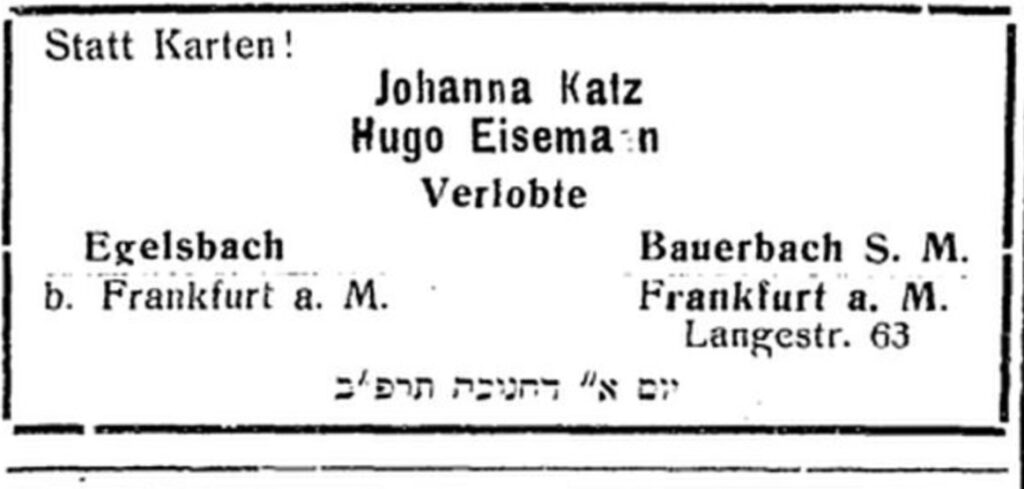 On 28 February 1922, Hugo, who was living in Frankfurt a/Main married Johanna Katz of Egelsbach in Hesse. Two of their children were born in Egelsbach: Manfred, b. 1923, and Emma, b. 1925. Their third child, Avrohom Dovid, was born in Frankfurt a/Main in 1928.
On 28 February 1922, Hugo, who was living in Frankfurt a/Main married Johanna Katz of Egelsbach in Hesse. Two of their children were born in Egelsbach: Manfred, b. 1923, and Emma, b. 1925. Their third child, Avrohom Dovid, was born in Frankfurt a/Main in 1928.

On 8 September 1922, Isak ‘genannt Julius,” married Ida Hamburger of Aschaffenburg, Bavaria; they lived in Meiningen, where Julius was a Schneidermeister, master tailor and a daughter, Ingeborg, was born in December 1925.
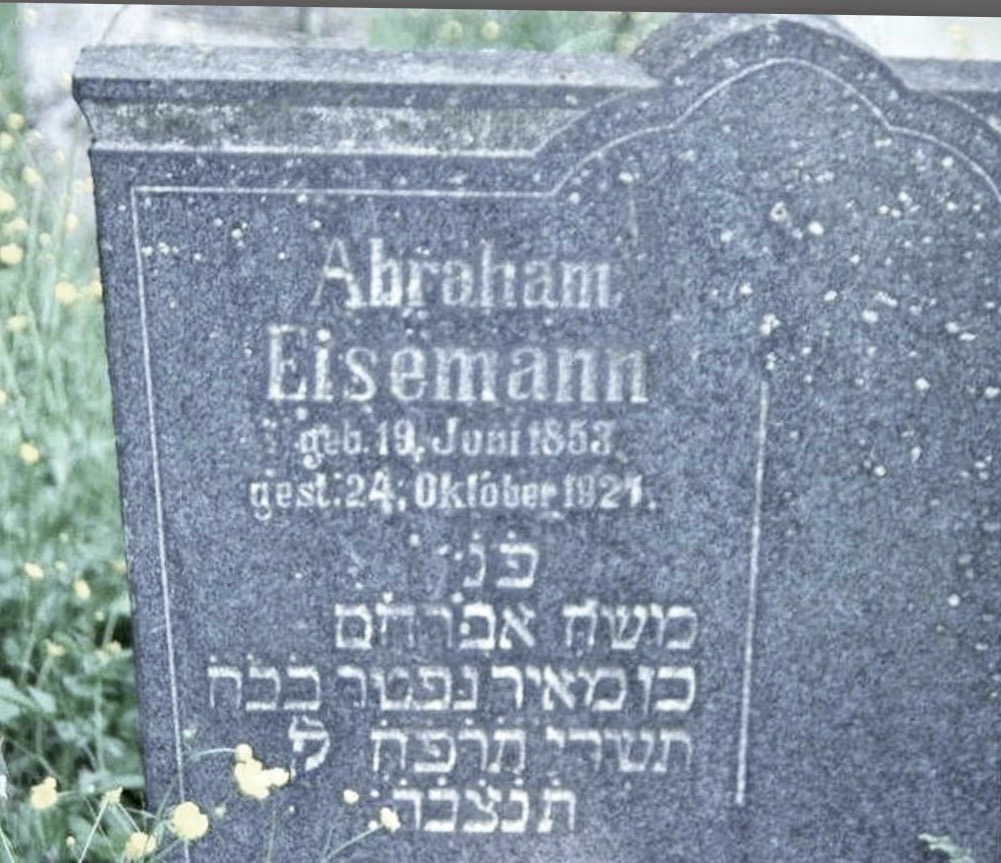
On 24 October 1924, Abraham Eisemann died in Bauerbach; he was buried in the Jewish cemetery of Bauerbach. His widow, Regina, remained in Bauerbach with her 34-year-old unmarried daughter Ricke.
Without any personal documents from the families, one can only speculate about family interactions. From a geographic perspective, frequest family interaction was possible for the families who lived in towns between Tiefenort and Bad Salzungen in the north, and Meiningen, Bauerbach, and Bad Neustadt in the south. It appears that the family group living in Bad Salzungen was close-knit and probably centred in the household of Klara and Willi Frank. Tiefenort, which was more or less a suburb of Bad Salzungen, allowed for visits between the Krämer and Frank families. En route to Bauerbach in the south was Meiningen, where Julius Eisemann lived. Then, there was Bauerbach where mother Regina and sister Ricke lived. To the west of Bauerbach lay Bad Neustadt and the family of Meinhold. An automobile would have allowed more frequent visits than before the war.
The only family living at considerable distance was that of Hugo Eisemann in Frankfurt a/Main about 175 km away from either Bad Salzungen or Bauerbach. It’s difficult to guess how often the whole family met during the year.
Members of other branches of the Eisemann family also interacted with the Abraham/Regina group. In 1931, for example, Max Moses moved from the Frank home to live with his cousin-through-marriage, Berta Eisemann, née Mühlfelder. Berta’s husband, also called Max Eisemann (b. 1876), had died in 1931, leaving her to run their men’s clothing business.
*****
When the Nazi Regime began, Max, his mother, and siblings were in Germany: Regine was in Bauerbach with Ricke, and Max and his siblings were in Thuringia, Bavaria, and Hesse. Max, Klara and her family, and Benno were in Bad Salzungen.
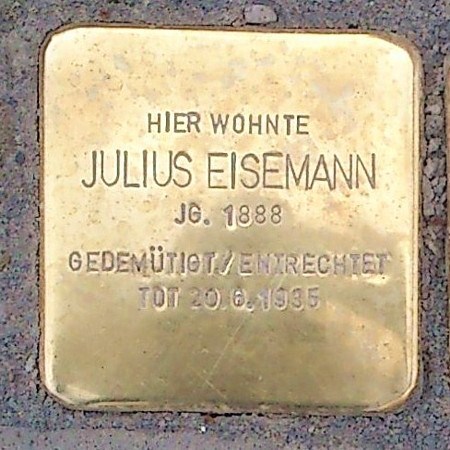 Two deaths occurred in 1935: on 13 May, Klara’s and Willy’s youngest son, 17-year-old Manfred Frank, died in Bad Salzungen; just over a month later, on 20 June, Julius Eisemann died in Meiningen. While the connection to Nazi persecution is not known at this time; both the family and the city of Meiningen identify Julius as a victim of the Holocaust (see Page of Testimony to Yad Vashem.); the city of Meiningen has laid a Stolperstein stating that he was “humiliated/disenfranchised.
Two deaths occurred in 1935: on 13 May, Klara’s and Willy’s youngest son, 17-year-old Manfred Frank, died in Bad Salzungen; just over a month later, on 20 June, Julius Eisemann died in Meiningen. While the connection to Nazi persecution is not known at this time; both the family and the city of Meiningen identify Julius as a victim of the Holocaust (see Page of Testimony to Yad Vashem.); the city of Meiningen has laid a Stolperstein stating that he was “humiliated/disenfranchised.
Members of several families started to flee Germany: the first to leave was Käte Krämer, daughter of Ida (née Eisemann) and Moses Krämer, who, according to a family tree, left for Palestine in 1936. On 28 September 1937, Meinhold and his wife, Thea (née Friedmann) obtained visas from the American Consul in Stuttgart to enter the United States; two months later, on 25 November, the family of four — Meinhold, Thea, Herbert, and Doris — sailed from Hamburg to New York City. They were sponsored by Thea’s brother, Paul Friedmann. The family settled in Hartford Connecticut.
Albert and Ilse Frank, as well as Avrohom Dovid Eisemann, the son of Hugo and Johanna, were also able to leave Germany. Ilse obtained her visa to enter the States in April 1938 and left from Hamburg, arriving in New York on June 24th 1938. She was sponsored by her aunt, Regina Goldschmidt/Goldsmith. The exact date of Albert’s emigration is unknown.
During the night of Kristallnacht/Reichspogromnacht, 9/10 November 1938, all of the Jewish people in Bad Salzungen were arrested and taken into so-called protective custody/”Schutzhaft“. The women, such as Klara Frank (née Eisemann), were released soon after their arrest, but most of the men were sent to Buchenwald concentration camp where they were later released after a few weeks.
The ensuing ‘aryanization’ of Jewish businesses meant that Max Moses had little reason to remain in Bad Salzungen. The windows of his mother’s house in Bauerbach had been shattered in the Pogromnacht, and Max Moses may have felt that his presence was most useful there. In 1939, soon after the events of Kristallnacht, Max Moses Eisemann moved back to Bauerbach to live with his mother and sister Ricke in House 50.
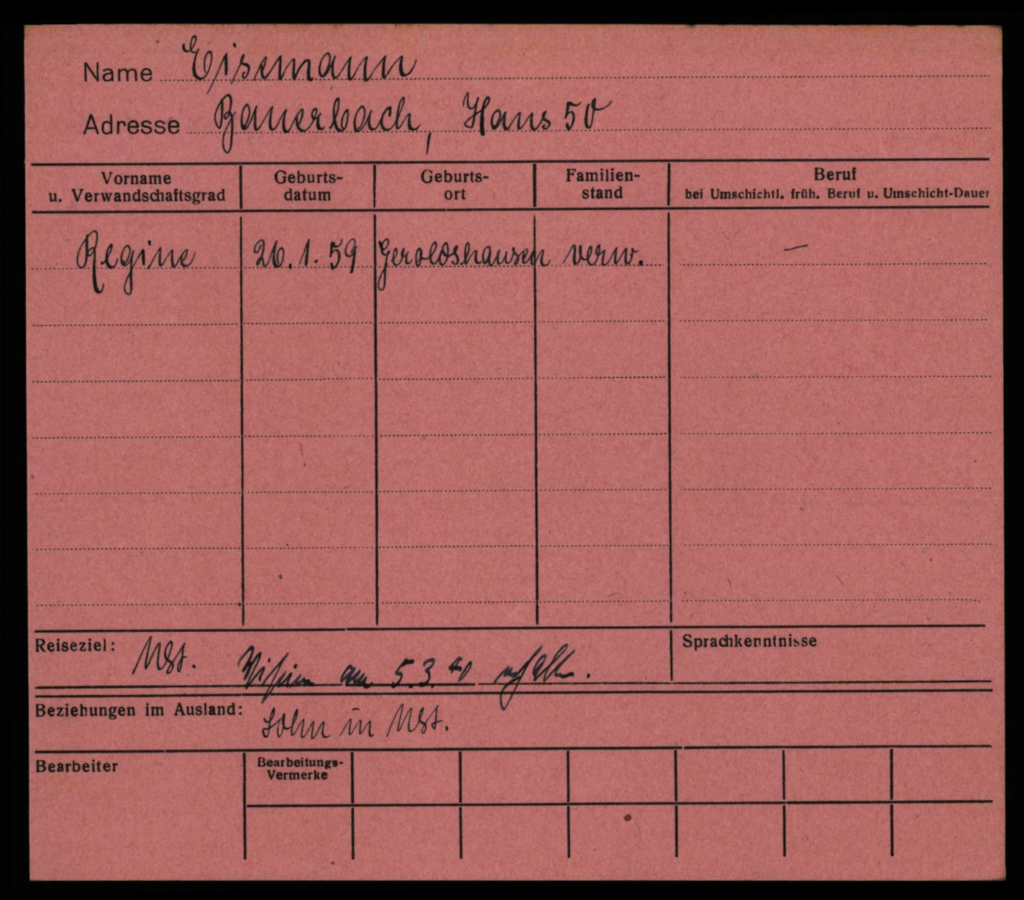
Kristallnacht prompted a huge surge in German Jews seeking to leave Germany. Regine Eisemann and at least three of her children — Klara, Ida, and Benno — made application to leave Germany as did Ida (née Hamburger), the widow of Julius. The undated emigration cards in the Arolsen Archive identify their “Reiseziel/destination” as “USA”. In Regine’s application, she identifies a son/Sohn (assumed to be Meinhold) as the person supporting her application. (As well, on her application, Regine did not include her daughter Ricke.) Clara and Willy Frank also identify USA as their destination and cite “relatives/Verwandte” as supporters. Whether they meant Meinhold or some relatives of Willy is not known.
*****
The Holocaust shattered the Eisemann family of Abraham and Regine. In October 1941, when the Nazi Regime decided to send German Jews east and prohibited emigration to refuge, eighteen members of Abraham’s and Regine’s family were trapped in Germany: Max, Regine and Ricke in Bauerbach; Ida and Moses Krämer, two daughters and a three-year-old grandson in Tiefenort; Julius’s widow, Ida (née Hamburger) and daughter Ingeborg, as well as Benno and Sophie in Meiningen; Willy and Klara Frank in Bad Salzungen; and Hugo and Johanna Eisemann and two children in Frankfurt a/Main.
In November of 1941, Hugo Eisemann, his wife Johanna née Katz, and two of their three children, Manfred and Emma Eisemann, were deported from Frankfurt a/Main to Minsk Ghetto. They were on the second major deportation from Frankfurt a/Main to the ‘east’, and on the third deportation to the ghetto in Minsk.
On 9 May 1942, Max Moses Eisemann left Bauerbach to go to Weimar. Two others, 42-year-old Erna Friedmann, b. 1899 and 3-year-old Isaak Friedmann, b. 1939 (her grandson?) travelled with him. Max’s sister, Ricke, eight years younger than Max, should have been on this transport, which was presented as a resettlement program for younger Jews. The probable explanation is that the Nazis allowed Ricke to stay with her mother, knowing that they could deport her in the fall to the ghetto in Theresienstadt.
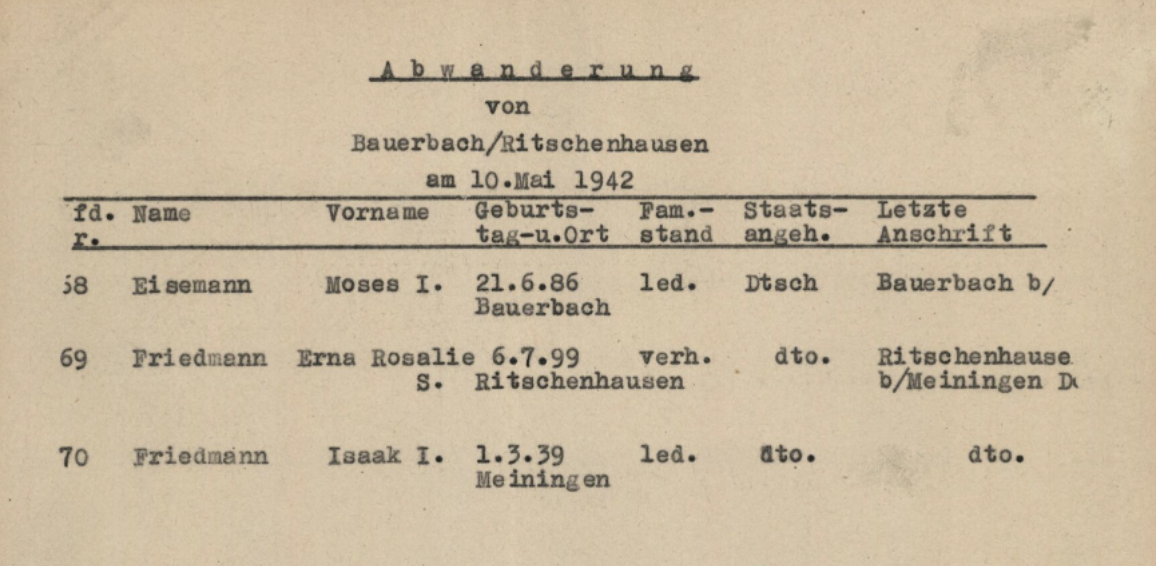 Arolsen Archives, 128450737 Max Moses Eisemann
Arolsen Archives, 128450737 Max Moses Eisemann
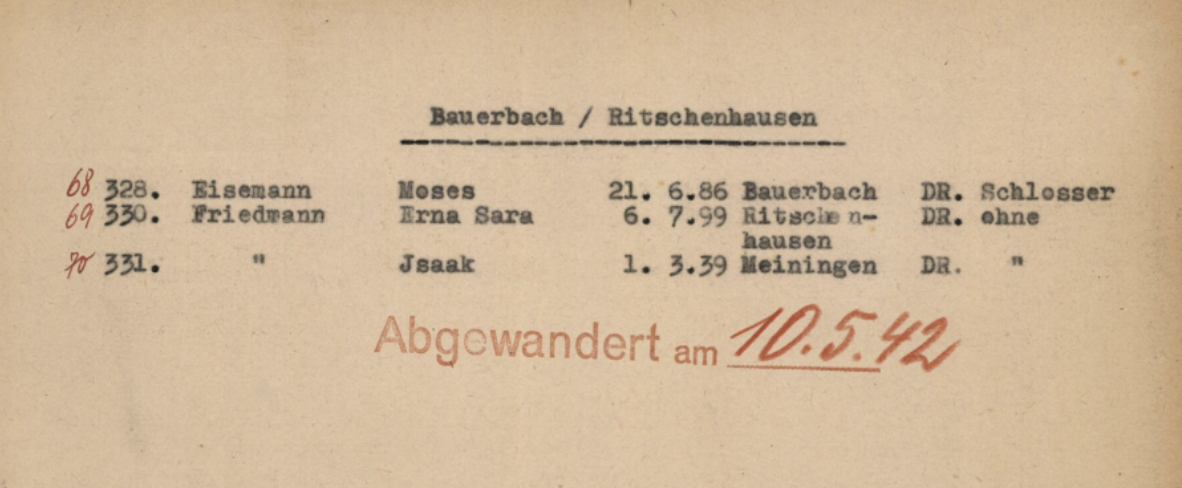
In Weimar, Max joined eleven members of his family: two sisters — Klara Frank (née Eisemann) and her husband Willy; Ida Krämer (née Eisemann), her husband Moses and two daughters, Isabella and Thea, and one three-year-old grandson, Joel; one brother, Benno, and his wife, Sophie, and sister-in-law, Ida Eisemann (née Hamburger), the widow of his dead brother, Julius, and daughter Inge. None survived.
*****
Regine and Ricke Eisemann remained in Bauerbach after the May deportation. The second major deportation of Thuringen’s Jews took place on 19 September 1942. Regine and her daughter Ricke left Bauerbach for Weimar and then on to Theresienstadt ghetto. Both Regine and Ricke signed a contract to buy a home in the ghetto, part of the snare and delusion by which the Nazis tried to persuade the Jews that the ghetto was a retirement spa. Regine died in the ghetto on 12 April 1943. Ricke Eisemann was transported from Theresienstadt to the killing centre at Auschwitz in October 1944.
*****
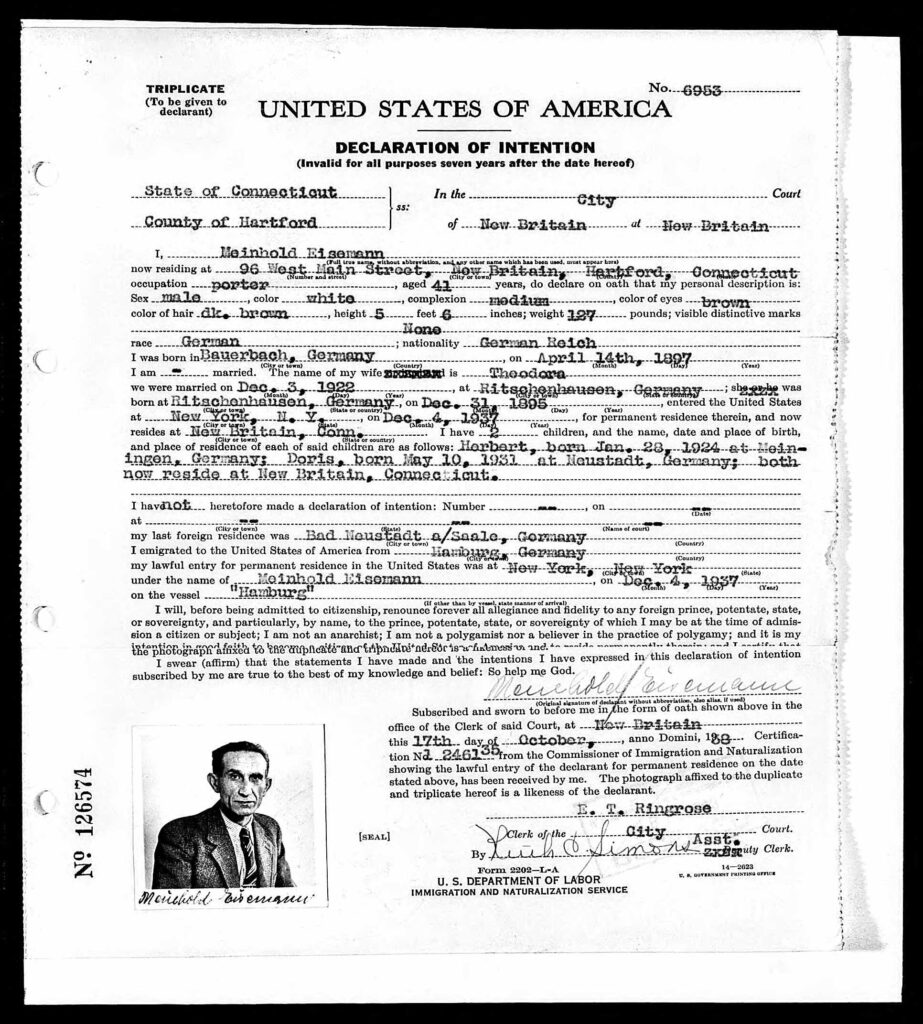 Traces of the lives of the Eisemanns who had managed to escape from Germany into the United States can be found. Without exception, they declared their intention of becoming American citizens.
Traces of the lives of the Eisemanns who had managed to escape from Germany into the United States can be found. Without exception, they declared their intention of becoming American citizens.
Marriages and families occurred: On 10 March 1940, Ilse Frank married Ludwig Wahle. Other marriages happened after the war: 1948, Herbert Julius Eisemann married Susan Roos, and they formed a family of three. In 1952, Albert David Eisemann (Avrohom Dovid changed his name in the United States), married Gertrude Pfifferling from Rhina in Hesse 1954; they raise four children. Doris Eisemann, Herbert’s sister, married William Victor Dworski, and they too formed a family.
Military records tell us that Meinhold Eisemann was registered in the army; his son, Herbert Julius, entered the army on 20 May 1943. Ludwig Wahle (Ilse Frank’s husband) was also registered in the American military forces. On 16 January 1946, Avrohom Dovid Eisemann was registered in the USA army.
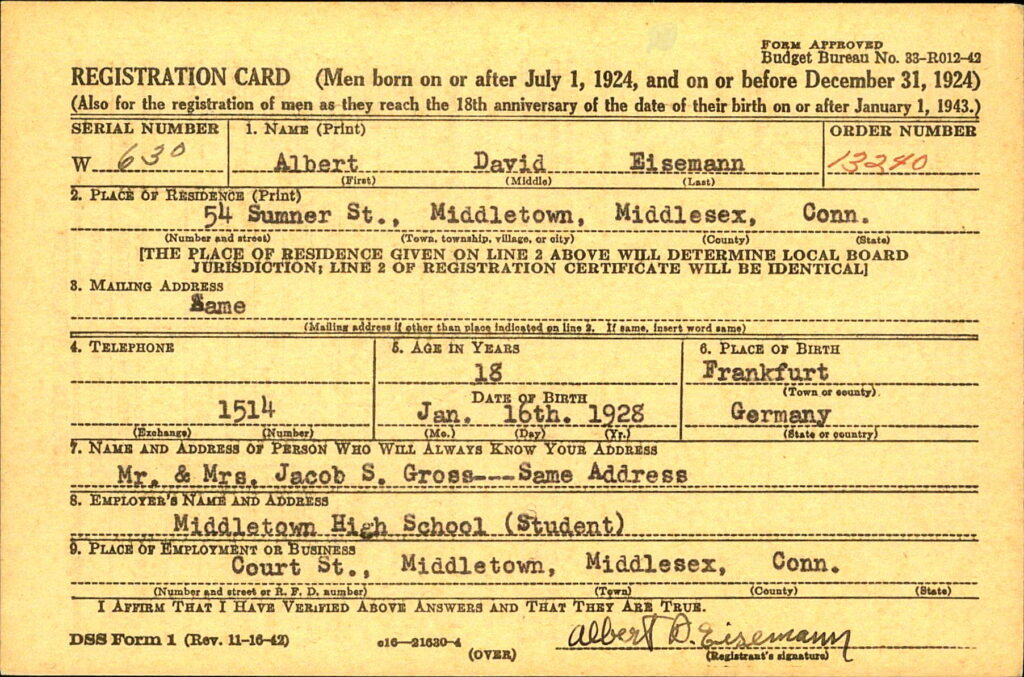
Stolpersteine have been laid for some members of the Eisemann family: In Bad Salzungen at Ratsstaße 9, Klara and Willy Frank; At Leipziger Straße 34 in Meiningen for Julius, Ida, and Ingeborg; And at Ernst-Ludwig-Straße 39 in Egelsbach for the family of Hugo and Johanna (née Katz) Eisemann.

We welcome any questions or comments, and any additional information about the Eisemann family. Please contact Sharon Meen at s.meen79@gmail
Sources:
- National Archives At Boston; Waltham, Massachusetts; ARC Title: Petitions and Records of Naturalization, 10/24/1939 – 6/7/1973; NAI Number: 4514229; Record Group Title: Records of District Courts of the United States, 1685-2009; Record Group Number: Rg 21
- Bayerisches Hauptstaatsarchiv; München; Abteilung IV Kriegsarchiv. Kriegstammrollen, 1914-1918; Volume: 2512. Kriegstammrolle: Bd. 2
- National Archives at St. Louis; St. Louis, Missouri; WWII Draft Registration Cards for Connecticut, 10/16/1940-03/31/1947; Record Group: Records of the Selective Service System, 147; Box: 125
- U.S., World War II Army Enlistment Records, 1938-1946
- U.S., Obituary Collection, 1930-Current
- Ancestry.com Family Tree